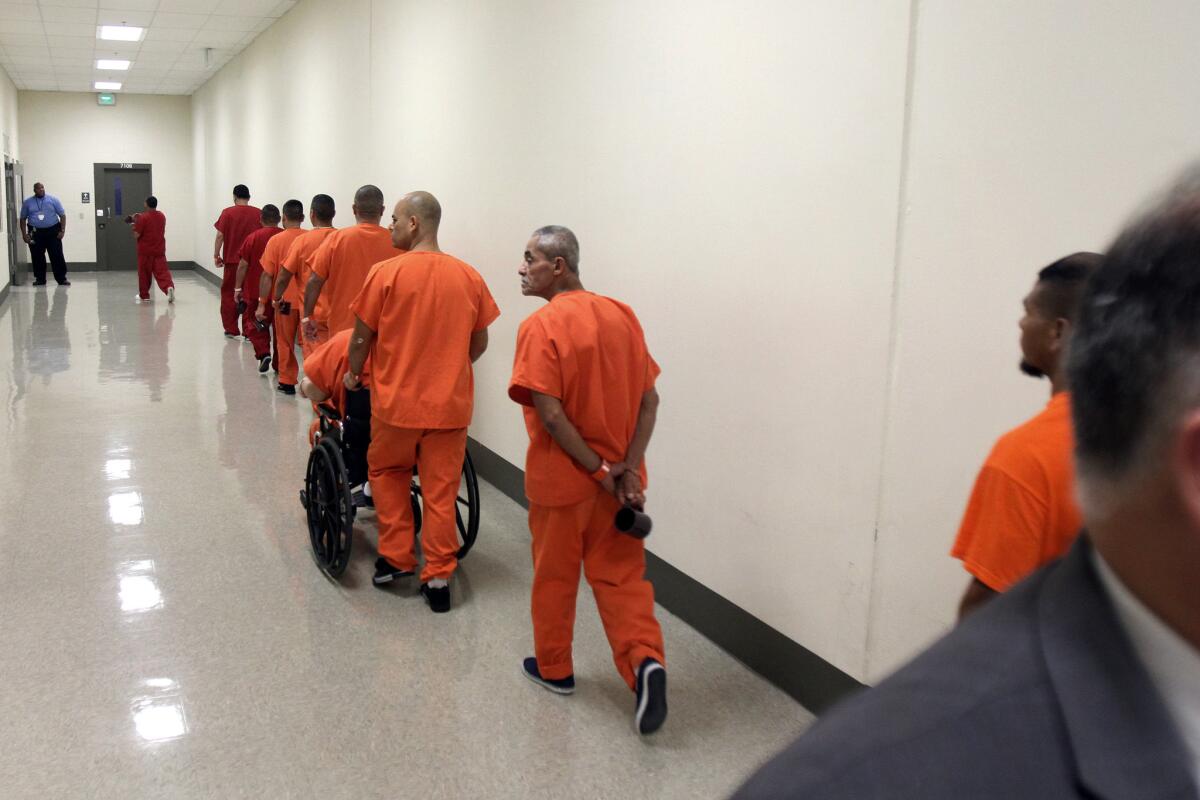Judge who ordered ICE to immediately release California immigrants overruled; detainees will stay put

- Share via
A panel of three 9th Circuit Court of Appeals judges on Tuesday overruled a lower court’s order to significantly reduce the number of detainees held at the Adelanto ICE Processing Facility northeast of Los Angeles.
The decision by judges Barry Silverman, Jacqueline Nguyen and Daniel Collins came in response to an emergency request by the Trump administration to halt the April 23 preliminary injunction ruling by U.S. District Judge Terry Hatter while it appeals his order. A preliminary injunction is temporarily issued early in a lawsuit to stop defendants from continuing harmful actions as the case moves forward.
In order to protect detainees from a potential coronavirus outbreak, Hatter had declared that the population at Adelanto — one of the largest immigrant detention facilities in the country — must decrease “to such a level that would allow the remaining detainees to maintain a social distance of six feet from each other at all times.” He had directed ICE not to allow any new detainees at the facility and to reduce the population by at least 250 people by April 30.
Adelanto has space for nearly 2,000 detainees but currently holds about 1,200. Nationwide, 29,700 people are in ICE custody.
Lawyers for the federal government appealed Hatter’s decision the day after it was issued, preventing any detainees from being immediately released.
The 9th Circuit judges left one aspect of Hatter’s decision intact: his requirement that the Adelanto facility administrators comply with the Centers for Disease Control and Prevention guidelines for detention facilities concerning COVID-19. The guidance includes ensuring that detainees receive medical evaluations and treatment at the first signs of having coronavirus; that those with symptoms wear a face mask and be placed in medical isolation; and that new intakes be quarantined for two weeks before entering the facility’s general population.
In his approval of the emergency request and in a partial dissent from the other two judges, Collins said he would have overruled Hatter’s requirement on the CDC guidance as well. Collins said that an injunction must “state its terms specifically.” But the CDC notes that guidance might have to be adapted based on issues like space, staffing and population.
“One of the many problems with the district court’s injunction is that it disregards the very sort of considerations that the CDC says may require adaption of the guidelines in the context of a particular facility,” he wrote.
The ruling comes in response to a lawsuit filed April 14 by the American Civil Liberties Union Foundation of Southern California and the law firm Latham & Watkins. Lawyers argue that conditions at Adelanto make the facility vulnerable to an outbreak.
Four to eight detainees live in cells as small as eight by 10 feet and share bathrooms, showers and dining tables. Detainees say they aren’t provided with enough cleaning supplies and masks, which ICE disputes. The agency says facilities have increased social distancing by introducing staggered meal and recreation times and suspending community service projects and social visits.
Late last week, advocates announced that several detainees at the Adelanto facility had begun a hunger strike — the second in recent weeks over coronavirus concerns. ICE spokeswoman Alexx Pons said just one detainee was on hunger strike. According to ICE policy, facility staff must record detainees not eating for 72 hours before designating a hunger strike.
“They make us clean only with shampoo and toothpaste, without any kind of liquid to sanitize the bathroom or the common areas,” said one detainee on strike whose name was withheld due to fear of retaliation, according to an audio file shared by the Inland Coalition for Immigrant Justice.
Though there have been no confirmed cases at the facility, only six detainees had been tested as of April 23, according to a declaration by Gabriel Valdez, assistant field director of enforcement and removal operations for ICE in Los Angeles. Two of those detainees were tested at a nearby hospital “as a local protocol,” where they were receiving medical care unrelated to the coronavirus. Valdez said that facility staff identified 323 detainees as high risk due to age or medical conditions, and that 66 of them were released.
As of Thursday, 674 detainees and 39 ICE employees at detention centers nationwide have tested positive for COVID-19.
ACLU attorney Minju Cho said it’s significant that the appellate court ordered ICE to come into compliance with CDC guidance at the facility.
“But we remain very concerned about people who remain detained at Adelanto and will do everything we can to protect them,” she said.
More to Read
Sign up for Essential California
The most important California stories and recommendations in your inbox every morning.
You may occasionally receive promotional content from the Los Angeles Times.











